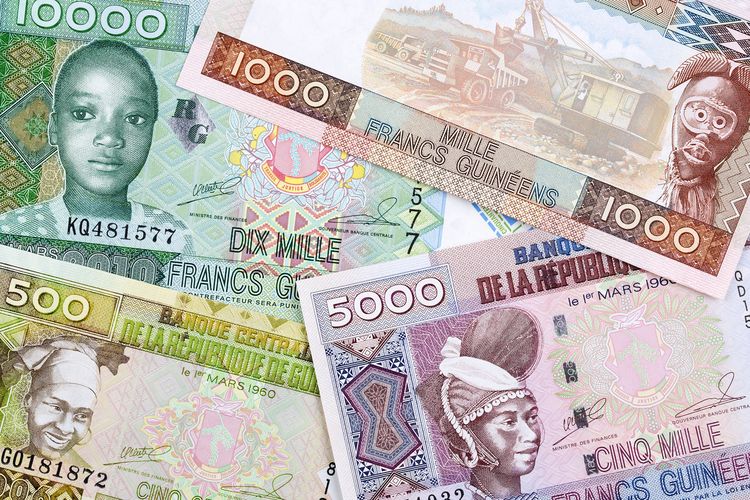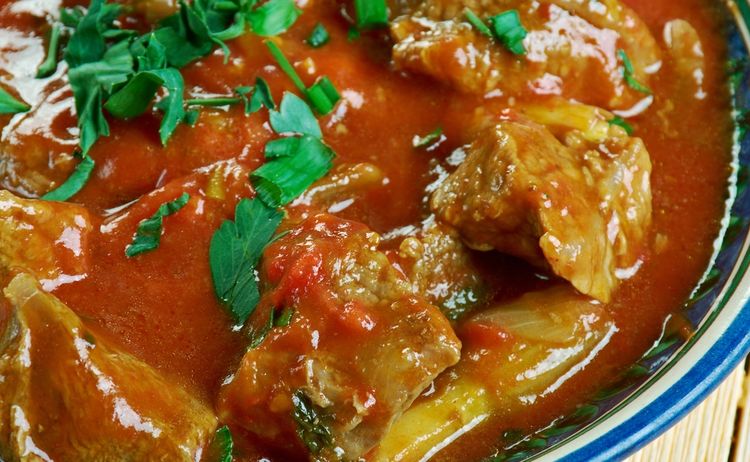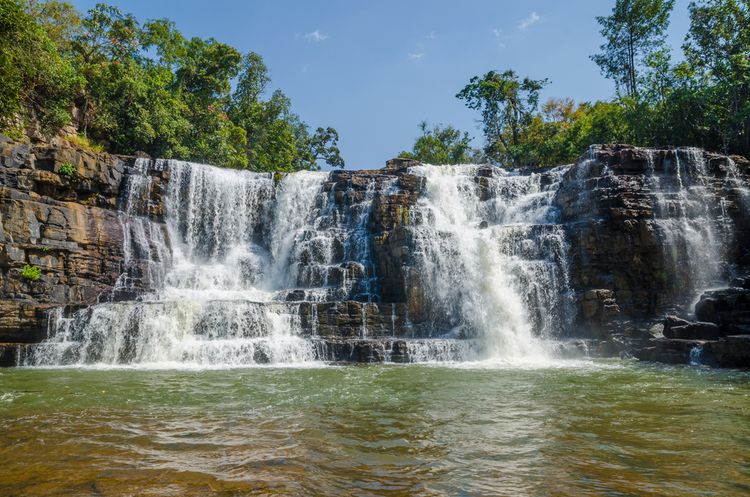Guinea Travel Tips and Information
Official Name
Republic of Guinea
Capital
Conakry
Population
Country Code
Approximately 14.8 million
GN
Country Code (international calls)
+224
The flight time to Guinea is approximately ---- hours. Check the climate, currency, religion, manners, other information of Guinea below. Wishing you pleasant travels to Guinea.
Guinea is a country located on the western edge of West Africa, facing the Atlantic Ocean. Its neighboring countries are Sierra Leone and Liberia to the south, Côte d'Ivoire to the southeast, Senegal to the north, Guinea-Bissau to the northwest, and Mali to the northeast.
Local Climate / Weather
Guinea enjoys a tropical climate, with distinct wet and dry seasons that influence its weather patterns. The wet season, typically from May to October, brings heavy rains and high humidity, making the landscapes lush and green. The dry season, from November to April, is characterized by warm temperatures, clearer skies, and the presence of the Harmattan wind, which carries dry, dusty air from the Sahara Desert. Temperatures in Guinea generally range from 24°C to 32°C (75°F to 90°F), with coastal areas experiencing milder conditions and the interior regions becoming hotter and drier. For travelers, the best time to visit Guinea is during the dry season (November to April). This period offers more favorable weather for exploring the country’s natural attractions, such as the Fouta Djallon highlands, the waterfalls near Kindia, and the beaches along the Atlantic coast. Roads and infrastructure are also more accessible during the dry months, as the wet season can make travel challenging due to flooding and muddy terrain. However, the wet season has its own charm, especially for nature enthusiasts who want to experience Guinea’s lush rainforests and vibrant ecosystems in their full glory. Guinea’s cultural calendar is vibrant, with events and festivals that reflect its rich traditions and heritage. One of the most significant celebrations is Tabaski (Eid al-Adha), a major Islamic festival marked by prayers, feasting, and community gatherings. Guinea also celebrates Independence Day on October 2, a patriotic occasion filled with parades and cultural displays. In addition to these, local festivals like the Fête de la Mare in Labé highlight traditional music, dance, and storytelling, offering a unique glimpse into Guinea’s diverse ethnic cultures. Timing your visit around these events can provide a deeper connection to the local culture and enhance your travel experience.
Currency & Tipping
Currency
Guinea’s official currency is the Guinean Franc (GNF). Banknotes are the most commonly used form of currency and are available in denominations ranging from 1,000 to 20,000 GNF, with smaller denominations used less frequently. Coins exist but are rarely used in daily transactions, as most people prefer cash for its convenience. Travelers should familiarize themselves with the colorful banknotes, as they will be handling them frequently during their visit. Currency exchange facilities are available in major cities like Conakry, but it’s advisable to exchange money at reputable banks or licensed currency exchange offices to avoid scams. The Guinean Franc is not widely traded internationally, so travelers may need to bring US Dollars (USD) or Euros (EUR) to exchange locally. It’s also wise to carry smaller denominations of cash, as merchants and service providers often lack change for larger bills. Credit cards are accepted in some upscale establishments, but cash remains king, especially in rural areas.
Tipping
Tipping is not a mandatory practice in Guinea, but it is appreciated as a gesture of gratitude. In restaurants, a tip of 5–10% of the bill is considered generous, especially in tourist-friendly establishments. For other services like hotel staff or tour guides, a small tip of 5,000–10,000 GNF is a kind way to show appreciation for good service. Travelers will find Guinea’s approach more relaxed but equally rewarding for those offering exceptional service.
Useful Travel Information

Voltage & Electrical Outlets
Guinea uses a 220V electrical system with Type C and Type F plugs, similar to those used in many European countries. Travelers should check if their electronic devices are compatible with 220V; otherwise, a voltage converter will be necessary. Additionally, it’s a good idea to carry a universal travel adapter to ensure your devices can fit the socket types available.

Internet Connectivity
The internet in Guinea is not as widely accessible or fast, especially outside major cities like Conakry. Hotels and some cafés may offer Wi-Fi, but the connection can be slow or unreliable. Travelers should consider purchasing a local SIM card with a data plan for more dependable access, particularly if they plan to venture into rural areas. Major providers like Orange Guinea offer prepaid packages suitable for short-term stays.
Water for Consumption (Drinking Water)
Tap water in Guinea is not safe for drinking without proper treatment, as it may contain harmful bacteria or contaminants. It’s best to stick to bottled water, which is widely available in cities and towns. Travelers should also avoid ice in drinks unless they are certain it was made from purified water and opt for sealed, branded bottles for peace of mind. Carrying a portable water filter or purification tablets can be a good backup when exploring remote areas.
Culture, Religion & Social Etiquette
Culture
Guinea is a vibrant tapestry of cultures, deeply rooted in its ethnic diversity and oral traditions. The country is home to various ethnic groups, such as the Fulani, Malinke, and Soussou, each contributing unique music, dance, and storytelling practices. Traditional music, especially the use of drums like the djembe, plays a central role in celebrations and ceremonies. Travelers will appreciate the warm hospitality of Guineans.
Religion
Islam is the dominant religion in Guinea, practiced by around 85% of the population, with Christianity and indigenous beliefs making up the rest. Daily life is shaped by Islamic practices, including regular prayers and observance of Ramadan. Travelers should be mindful of the cultural significance of these practices and dress modestly, especially when visiting religious sites or during holy months. Learning a few respectful phrases, such as "As-salamu alaykum," can also create positive connections with locals.
Social Etiquette
Politeness and respect are integral to Guinean social interactions. Greeting people warmly, often with a handshake, is customary and shows good manners. When visiting someone's home, it’s polite to remove your shoes and accept refreshments as a sign of respect. Travelers should also avoid public displays of anger or frustration, as maintaining composure and showing respect are highly valued in Guinea. Understanding these social nuances can help foster a meaningful and enjoyable experience.
Food Culture
Guinea’s food culture offers a rich blend of traditional West African flavors that travelers will find both hearty and flavorful. The cuisine features staple ingredients like rice, cassava, and plantains, often paired with spicy sauces and stews made from peanuts, okra, or fresh fish. Street food is an integral part of daily life, with popular snacks like fried plantains, grilled meats, and akara (bean fritters) available in bustling markets. For an authentic dining experience, visitors can explore local restaurants in Conakry, such as Le Damier or Restaurant La Paillote, which serve traditional dishes like poulet yassa (chicken with onions and lemon) and jollof rice. Sampling Guinea’s vibrant culinary offerings is a must for any traveler looking to immerse themselves in its culture.
Major Tourist Attractions & UNESCO World Heritage Sites
Major Tourist Attractions
Guinea is a hidden gem for adventurous travelers, offering stunning natural landscapes and vibrant cultural experiences. Tourists will enjoy exploring the Fouta Djallon highlands, known for their dramatic cliffs, waterfalls, and lush greenery—perfect for hiking and nature photography. The capital city, Conakry, is a lively hub where you can visit the National Museum of Guinea to learn about the country’s history and vibrant traditions. For those seeking relaxation, the Loos Islands, located just off the coast, boast pristine beaches and crystal-clear waters, ideal for swimming, snorkeling, and sunbathing. These destinations showcase Guinea’s rich diversity, providing unforgettable experiences for nature lovers and culture enthusiasts alike.
UNESCO World Heritage Sites
Travelers with a love for history and culture will appreciate Guinea’s UNESCO World Heritage Sites. The Mount Nimba Strict Nature Reserve, shared with Côte d'Ivoire and Liberia, is a must-see for its unique biodiversity, including endangered species and breathtaking landscapes perfect for eco-trekking. Another significant site is the Niger River Basin, where visitors can witness traditional fishing communities and explore the area’s archaeological significance. These heritage sites not only offer incredible scenic beauty but also provide a deeper understanding of Guinea’s cultural and environmental importance, making them essential stops for any travel itinerary.
Travel FAQs
What is the safety situation in Guinea like? What should travelers be careful of?
Guinea has a Level 3 travel advisory, indicating that travelers should reconsider visiting due to crime, civil unrest, and health concerns. Travelers should exercise caution, avoid demonstrations, and stay informed about local conditions.
What is the best season to go to Guinea?
The best tourist season in Guinea is the dry season, from November to February.
Is English spoken in Guinea?
No, English is not widely spoken in Guinea. The official language is French, and various indigenous languages such as Fulani, Malinke, and Soussou are commonly used.
What is the most popular airport to fly to Guinea?
Conakry International Airport, located in the capital of Guinea, is popular.
What are the major cities in Guinea?
Conakry, the capital of Guinea, is a port city located on the Atlantic Ocean side in the west of the country. It is a thriving city with a population of 1 million.




